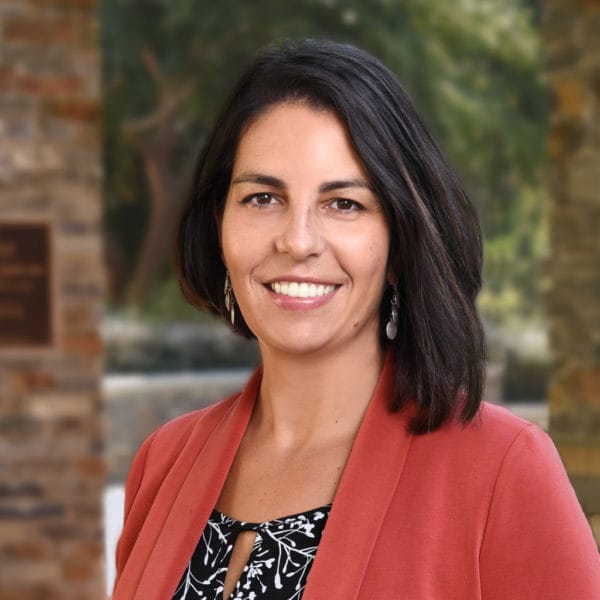Gloria González-Morales (she, her/s, ella), is an associate professor of psychology and director of the Worker Wellbeing (WW) Lab at CGU. The WW Lab is a feminist research lab that welcomes scholars interested in employee health, flourishing, and belonging through the disciplines of occupational health psychology and positive organizational psychology.
González-Morales is associate editor of Journal of Business and Psychology and Work & Stress Journal. She also serves on the editorial boards of Journal of Occupational Health Psychology, Stress & Health, and Occupational Health Science.
Her research, funded with international scholarships and grants (including a prestigious Fulbright scholarship and funding from the Canadian Foundation for Innovation), has been published in some of the world’s top-ranked psychology outlets such as Journal of Applied Psychology, Journal of Occupational Health Psychology, and Journal of Organizational Behavior.
González-Morales’s research was awarded the 2017 best paper award from the European Journal of Work and Organizational Psychology for her research on respite workplace interventions to foster employee well-being. She was also awarded the Journal of Occupational Health Psychology Best Paper Award (2017 and 2018) for her intervention study to reduce abusive supervision.
González-Morales has more than 15 years of experience consulting for organizations from Canada, Europe, and the U.S. in different sectors (i.e. government, healthcare, hospitality, non-for-profit, energy, and manufacturing). As executive director of Organization & Management Solutions (2013-2020), she led more than 20 consulting projects in diverse areas of practice. These included competency modeling and recruitment and selection systems; organizational development and change; needs analysis; performance management systems; engagement surveys; as well as leadership and team development and training.
González-Morales was born in Tenerife (Canary Islands) and obtained her psychology degree at Universidad de La Laguna (Canary Islands). She completed her dissertation and was awarded with the European PhD (Doctor Europaea) in 2006 from the University of Valencia (Spain) in the work and organizational psychology interuniversity doctoral program. She was a Fulbright Visiting Scholar at George Mason University and postdoctoral fellow at University of Delaware (funded through the Army Research Institute) before starting at University of Guelph on May 2010. She has been with Claremont Graduate University since January 2020.
Co-authored with C. Dotzler. “A Gendered Multi-level Model of STEM Entrepreneurship.” In Gender, Diversity and Innovation: Concepts, policies and practice, edited by B. Owalla, et al. London: Edward Elgar Publishing, Forthcoming.
Co-authored with A. Michel, et al. “Mindfulness and Positive Activities at Work: Intervention effects on motivation-related constructs, sleep quality and fatigue.” Journal of Occupational and Organizational Psychology, (2021).
Co-authored with A.S. Davis, et al. “Team Belonging: Integrating Teamwork and Diversity Training Through Emotions.” Small Group Research, (2021).
“A more feminine scholarship: Relational practice for setting a good example.” Academy of Management Learning & Education, Special Issue: Rhythms of Academic Life: Frost and Taylor 20 Years on 18, no. 2 (2019): 302-05.
Co-authored with M.C. Kernan, et al. “Defeating Abusive Supervision: Training Supervisors to Support Subordinates.” Journal of Occupational Health Psychology 23, no. 2 (2018): 151.
Co-authored with J.A. Gruman and M.N. Lumley. “Incorporating Balance: Challenges and Opportunities for Positive Psychology.” Canadian Psychology/Psychologie Canadienne 59, no 1 (2018): 54.
Co-authored with A. Steidle, et al. “Energizing respites from work: a randomized controlled study on respite interventions.” European Journal of Work and Organizational Psychology 26, no. 5 (2017): 650-62.
Co-authored with P. Neves. “When stressors make you work: Mechanisms Linking Challenge Stressors to Performance.” Work & Stress. An International Journal of Work, Health & Organisations 29, (2015): 213-29.
